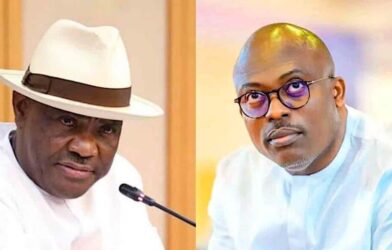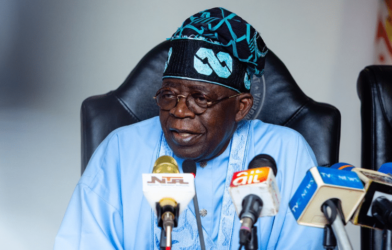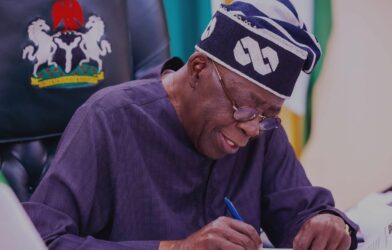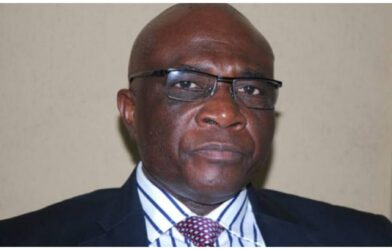One person who understands Nigeria very well both in and out, is Mrs. Ngozi Okonjo-Iweala who is now the Chief Executive of the World’s Trade Organisation based in Central Europe.
She served as federal minister and headed two ministries at different times during the government of President Olusegun Obasanjo. She was at one time the minister of Finance and Budget. She recently penned a book on corruption and offered us some insights on how so dangerous it is to fight corruption. I must state that at no time has it become deadlier to fight corruption than the way it is since the last 8 years of the Muhammadu Buhari’s administration. I digested this book of less than 200 pages written by Professor Ngozi Okonjo-Iweala, and I must applaud her for her boldness in speaking truth to power demonstrating that she has no skeleton in her cupboard because only the guilty are afraid to talk.
In that book, she, Ngozi Okonjo-Iweala asserted that: “Nigeria is one of the most interesting countries in the world. It is energetic and sometimes chaotic, and its people are wonderfully entrepreneurial. Nigerian women are particularly enterprising. The actions of a small percentage of Nigeria’s population have given the country a bad name-one associated with corruption-and this book talks about that.”
She said too that: “But the overwhelming majority of Nigerians are honest, hardworking citizens who want what citizens elsewhere want-for their government to provide peace, stability, and basic services and then get out of their way so they can live their lives.”
Nigeria, according to NOI is a fledgling democracy patterned on the American style with a powerful elected executive president and vice president.
Ngozi Okonjo-Iweala (NOI) affirmed too thus: “There are several political parties, but the two main ones are the People’s Democratic Party (PDP) and the All Progressives Congress (APC), which is currently the governing party. Nigeria gained its independence from Britain in 1960 and briefly tried the British parliamentary style of democracy before going through a civil war (the Nigeria-Biafra war) from 1967 to 1970 and lapsing into military rule for a long period. The current democratic period began in 1999 after almost three decades of military rule were interspersed with brief periods of civilian rule.
“The country’s 1999 constitution provides for a federal government; a Federal Capital Territory where the capital, Abuja, is located; thirty-six states whose governors are elected; and 774 local governments.”
The states, she recalled, are grouped into six geopolitical zones-North West, North Central, North East, South West, South East, and South-South.
Some of them, such as South East and South West, coincide with major ethnic groups such as the Igbo and Yoruba respectively, and others are home to myriad ethnic groups. The legislature forms an important arm of government, with an upper house or Senate with 109 members and a lower House of Representatives with 360.
Due to its size and economic importance, NOI informed us that Nigeria matters for West Africa, Africa, and the world.
She said: “This is why good political and economic governance is essential for the country and why the world must pay attention and lend its support to ensure that Nigeria moves onto the right development path. Discussing candidly, as this book does s, where and why corruption happens, what is being done to fight it, and what more needs to be done is an important part of clearing the way for Nigeria’s entrepreneurial people to fulfil their potential”. (FIGHTING CORRUPTION IS DANGEROUS BY NGOZI OKONJO-IWEALA).
Ironically, this situation expounded in that book is still true of present day Nigeria just as corruption has become a hydraheaded monster.
It is true that the present administration of President Muhammadu Buhari has reached its eleventh hour, but major characters in the current Central government under the banner of the political party known as the All Progressives Congress (APC) are really not tired of springing up shocking and revealing plots that raise integrity and credibility questions regarding how public finance is administered.
By the time the final whistle is blown for the end of Muhammadu Buhari’s administration on May 29th 2023, there will certainly be general outcry from all across the Country for some sort of forensic inquisition to ascertain how these ministers and their agents have spent tax payers money.
It is certainly looking so murky in some of these ministries like that of humanitarian Affairs and disaster management that around August of 2022 made a fantastically unproven claim that it spent N6.2 billion to train youths in phone repairs in Bauchi State, North Central Nigeria. One year after, the question hanging about this aforementioned claim is the lack of transparency and Accountability.
Ironically, in 2023 the husband of this Madam minister of humanitarian affairs who himself had about two years ago retired as Nigeria’s Air Force Chief of staff, ran unsuccessfully to be elected Bauchi State governor on March 18th 2023. Her ministry made other claims regarding the school.feeding programme that must be thoroughly investigated.
Interestingly, Nigerian media is replete with stories from most of these federal ministries which quote figures for public maintenance of certain public utilities that are not really believable. Sports ministry is the one in the news and it is about the figure of the amount the minister wants from public fund to maintain the National Stadium in Lagos which as reported had already gulped a million United States dollars. So how was that whooping 1 million USD utilised? Another issue is why is there no forensic investigations regarding how these publicly funded facilities are administered from day to day especially by way of stating clearly the issues around revenues generated and the procurement system in place.
The simple question to ask is, why inject so much public fund into a facility that the usage is not adequately accounted for in terms of revenues generated given the fact that private and public non-sports related events take place in that specific national stadium in Lagos? That facility hosts a number of shops and events by private bodies who pay heavily for the spaces allocated to them. Where are the revenues?
Before we return to the latest scandalous story about how much the minister of sports under Muhammadu Buhari has asked to be granted to fix the National Stadium in Surulere Lagos, let us look at how private ownership of stadiums thrive in places like the United Kingdom and then we pose the question why is the Nigerian situation different? Why do we need to take public funds to fix utilities that should be revenue yielding? I will just quote a story of the Emirate Stadium in London from a foreign publication.
A British press stated that in addition to the names of league members changing significantly over the years, so too have the stadiums that these clubs occupy. Some have boosted capacity by building new stands at their existing homes whereas others have upped sticks and moved to brand spanking new stadium. But regardless of their age or location, who actually owns the freehold to the Premier League’s grounds?
On the eve of the new football season, Property Week, in partnership with data provider Datscha, decided to find out. The paper gave blow by blow accounts showing that stadiums are owned by privately owned sporting companies and the Wembley Stadium is owned by the Football federation which is a very wealthy corporate body of football governors.
So the publication stated that cross referencing the freehold information held by Datscha with company ownership data from Companies House and other data sources, we have compiled a list of the ultimate owners of these grounds. The names of these owners may not as obvious as you would think.
The third most valuable football club in England moved to its current stadium in 2006, at a site which was previously occupied by the Ashburton Grove waste recycling plant.
In 2006. Prior to the switch the club’s home for 93 years was Highbury, which in 2010 was converted into a block of 711 flats – the ‘Gunners’ retained the freehold of the site.
The freehold to the Emirates, which is the third largest stadium in the country, is registered to Arsenal (Emirates Stadium) Limited. The ultimate controlling party is KSE UK Inc, a vehicle of US entrepreneur Enos Stanley ‘Stan’ Kroenke, the club owner.
A peep at another British Newspaper show us deeper insights on ownership of stadiums. This could be deciphered from the story on the bidding to host the Uefa competition in the UK.
The publication stated that the four UK nations and Ireland have submitted a dossier to Uefa outlining their plans to host Euro 2028, with 14 stadiums across the five countries shortlisted to hold matches, including Everton’s future home at Bramley-Moore Dock and Sunderland’s Stadium of Light, one of two north-east venues selected. A final list of 10 will be submitted in April 2023.
It said that in the Northern Ireland, Scotland and Wales each have one stadium and the Republic of Ireland two, with the remaining nine in England, including two in the north-east, which was controversially overlooked for this year’s Women’s European Championship.
The information is that the stadiums selected are: Villa Park, Everton Stadium, London Stadium, Tottenham Hotspur Stadium, Wembley Stadium, Etihad Stadium, St James’ Park, Stadium of Light, Old Trafford, Dublin Arena, Croke Park, Belfast Casement Park Stadium, Hampden Park and the Principality Stadium in Cardiff.
The UK government is thought to be confident that its joint bid will be approved by Uefa, with Turkey the only other country in the running. Russia had announced its intention to bid but was ruled out by its Uefa ban from football since its invasion of Ukraine. Uefa’s executive committee will decide the hosts in September 2023.
A joint statement from the UK nations and Ireland outlining their preliminary vision for the tournament said all stadiums were well connected. It added: “The UK and Ireland’s track record of hosting successful major sporting events over many decades means we have the expertise and experience to take this world-class tournament to new heights.”
The UK and Ireland this year shelved plans to host the 2030 World Cup. The English Football Association’s chief executive, Mark Bullingham, cited vast expense and “many areas of uncertainty”.
So I asked, why are Stadiums a burden to the public?
The investigatice report by Nigerian Guardian pointed out truly that Nigerians have questioned Sports Minister, Sunday Dare’s claim that the Federal Government will require over N21 billion to fix the National Stadium, Lagos, which has already gulped $1 million of renovation fee.
They argued that the minister’s quoted amount could build a new stadium from scratch.
The Guardian recently highlighted the sorry state of the Lagos National Stadium, eliciting disenchantment of the general public over the poor handling of the national monument.
Following the furore that trailed the story, the minister flew into Lagos to inspect the complex, and thereafter, addressed journalists on the steps taken so far by his administration to bring the stadium back to life.
Dare disclosed that it would cost about N40 billion to renovate the National Stadium, adding, however, that if he gets N21 billion for the job, he will manage it.
Questioning the figures, former Green Eagles’ winger, Adegoke Adelabu, a sports scientist, said the money is enough to build a new stadium with modern facilities.
“It is outrageous,” Adelabu said in a message to The Guardian. “How many times will the government rebuild the National Stadium? We need to ask who is collecting money from the people doing business inside the stadium. The institute within it is under-utilised.
“I know that people collect tickets to come into the stadium. So, who are the people involved? Who do they account to? I think the sports minister should forget such unproductive ideas, which I know that Nigerians will not tolerate. More so, we are the only country who runs sports at a loss,” he stated.
The Chairman of Gombe State Athletics Association, Ahmed Gombe Shuaibu, commended The Guardian for exposing the rot in government. “All of the comments I am reading have not dissected the very investigative journalism issues raised by The Guardian. Many are trying to defend the minister as if he did the nation a favour.
“When he came, he announced that he would fix the two stadiums through adopt-a-stadium initiative with Aliko Dangote and Baba Ijebu as sponsors. Dare made so much noise about it. He managed to fix the MKO Abiola Stadium under very controversial circumstances and without transparency,” he stated.
Gombe said he was expecting the ministry to announce the reopening of the Lagos stadium after assuring Nigerians “that it will be delivered soon. Dare even captured it as Buhari’s achievement while presenting his scorecard.
“Unknown to many, until The Guardian came up with the true situation, Dare wanted to sneak away on May 29 without delivering the stadium. How on earth can this same man take us for a ride by saying he needs N22 billion to deliver the stadium? So, what did Dare show to Baba Ijebu, and what were the terms of the MoU between him and Baba Ijebu? If not for The Guardian, will Nigerians ever know that Dare lied to us? Could Nigerians ever know that they need to cough out N22 billion to fix the Stadium?”
He advised the minister to apologise to the traders that lost their stalls in the stadium since he could not achieve the purpose of chasing them away.
Now, these doubts in the minds of millions of Nigerians as mirrored in this detailed feedbacks from Nigerians by the flagship of Nigerian media The Guardian, are obvious due to increasing loss of public trust. One American analyst writing about the USA with regards to how institutions are administered, seems to have reported exactly how Nigerians feel and I will cite the report as if I’m addressing the aforementioned issue of loss of public trust, lack of transparency and Accountability in the running of public institutions by politicians and technocrats.
The analyst stated that “the increasing loss of public trust in U.S. government institutions is of urgent concern. Efforts to diffuse public cynicism about these institutions have met with little success. But there is a solution. Rather than trying to persuade the public that they should trust the government, we should create a government worthy of the public’s trust. A fundamental first step in this direction is strengthening the accountability measures — the checks and balances — that curb abuses of power and ensure our institutions are responsive to the people. Cynicism is caused by of a lack of accountability when public officials violate the public trust and government is no longer seen as responsive to the needs of the people.”
These are the same concerns about the figure bandied about by this apparent young minister of youths and Sports in the government of President Muhammadu Buhari known as Sunday Dare. Sunday Dare, show the public the audits of how these publicly maintained stadiums are carried out and tell us why the private sector is not involved in the ownership of major, functional stadiums in the Country.
EMMANUEL ONWUBIKO is head of the HUMAN RIGHTS WRITERS ASSOCIATION OF NIGERIA and was NATIONAL COMMISSIONER OF THE NATIONAL HUMAN RIGHTS COMMISSION OF NIGERIA.












Comments are closed